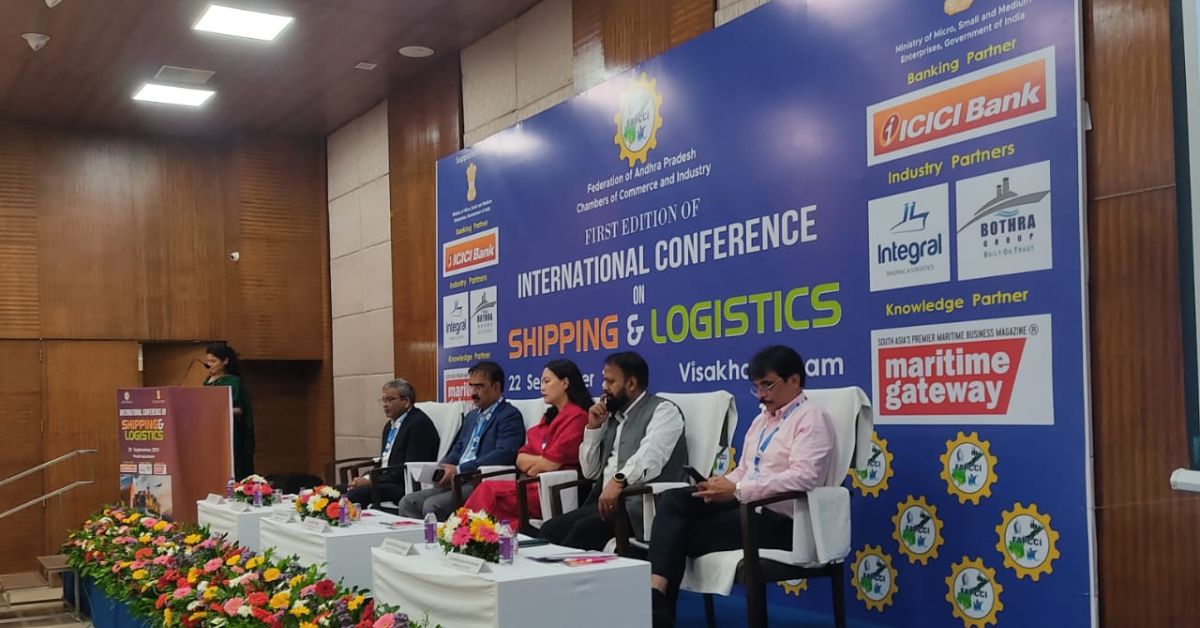The first International Conference on Shipping and Logistics, organized by the Federation of Andhra Pradesh Chambers of Commerce and Industry (FAPCCI) in collaboration with Maritime Gateway was organised on Friday. AP Maritime Board Deputy Chief Executive Officer, Lt Cdr BM Ravindranath Reddy, said they will take measures to promote exports from the state.
He mentioned that the board will actively support industries and traders in expanding their operations through the development of essential infrastructure and a conducive ecosystem. Lt Cdr Reddy also emphasized the significant contribution of dry ports in managing substantial export and import volumes for the state.
Participating as the Guest of Honour, Mr. Reddy stated that their primary objective is to stimulate and facilitate increased trade originating from the state to enhance the regional economy.
He emphasized that with the Central Government’s Gati Shakti initiatives as a cornerstone for progress and the introduction of a logistic policy by the Andhra Pradesh state government, there exists significant potential for growth within the shipping and logistics sector. Furthermore, he underscored the pivotal role played by dry ports in the global supply chain, particularly in assisting exporters and importers situated at a distance from seaports.
Mercy Epao, the Joint Secretary for Small and Medium Enterprises (SME) at the Ministry of Micro, Small, and Medium Enterprises within the Government of India, emphasized the pivotal role that the MSME industry plays in the growth of the Indian economy. She highlighted that this sector’s impact on the nation’s GDP accounts for approximately one-third of the Gross Value Added (GVA) and contributes to nearly half of the country’s total exports. Furthermore, she noted that the MSME sector is a significant source of employment, particularly in rural and less developed regions, contributing to the reduction of regional disparities.
In order to nurture the expansion and advancement of the MSME sector, she said we are executing a variety of initiatives and programs that encompass a broad spectrum of areas. These encompass extending credit support, fostering new enterprise creation, promoting formalization, providing technological aid, facilitating infrastructure development, offering skill enhancement and training opportunities, as well as extending market support to MSMEs.
The introduction of the Udyam Assist Platform (UAP) represents another noteworthy step taken by the government. Its objective is to incorporate Informal Micro Enterprises (IMEs) into the formal framework, thus granting them access to the advantages offered through Priority Sector Lending (PSL).
In his welcome speech, Karunendra S. Jasti, the President of FAPCCI, expressed that the strategic alignment of central government policies such as the PM Gati Shakti initiatives and the National Logistics Policy, along with the dynamic logistics policy of Andhra Pradesh, paints an inspiring vision of progress and advancement.
The strategic positioning of Andhra Pradesh and its extensive coastline have established it as a crucial participant in international trade. In the fiscal year 2023, the state’s merchandise exports showed remarkable growth, reaching an impressive figure of US$ 19.32 billion. Of these exports, marine products accounted for 13.62%, highlighting the state’s excellence in this sector. Moreover, Andhra Pradesh’s potential in this regard is reinforced by its determined efforts to improve infrastructure, optimize logistics, and create a business-friendly atmosphere.
In order to strengthen this path of growth, the Andhra Pradesh government’s forward-looking strategies, including the establishment of logistics infrastructure, industrial parks, warehouses, Special Economic Zones (SEZs), and a range of customized incentives, have provided additional momentum. These well-planned investments are set to substantially improve the business environment, positioning Andhra Pradesh to become a prominent contributor to port-based industrialization at the national level.
In his keynote speech, G. Sambasiva Rao, Managing Director of Sravan Shipping Services Pvt Ltd and Vice President of the National Association of Container Freight Station, highlighted that any city situated along a seacoast with an extensive coastline is bound to experience an increase in opportunities and development. In fact, Visakhapatnam has the potential to evolve into a prominent global cargo hub, owing to its strategic geographical location, expanding economy, and the ongoing enhancements in its infrastructure.
He emphasized that the current imperative revolves around prioritizing infrastructure development. Expanding and modernizing transportation networks, such as roadways, railways, and airports, are crucial to ensure smooth cargo transportation. The establishment of intermodal transportation hubs would elevate connectivity, efficiency, and cost-efficiency. Streamlining customs procedures, reducing administrative obstacles, and adopting digital documentation would expedite cargo handling. This would not only improve the Ease of Doing Business (EoDB) but also curtail delays and their related expenses.
In a panel discussion titled “Enhancing Logistics Efficiency,” professionals from the shipping and logistics sector expressed the view that harnessing technology has the potential to enhance the performance of logistics networks, cut down on expenses, and elevate customer satisfaction. Embracing state-of-the-art technologies like GPS tracking, RFID tags, and artificial intelligence can be instrumental in enhancing the effectiveness of your logistics operations. The digitization of logistics is playing a pivotal role in enhancing supply chain management, leading to cost reduction and improved customer service.
Delegates from Sri Lanka, Bangladesh, and Colombo were actively engaged in a panel discussion titled “Ports & Allied Infrastructure and Coastal Shipping: Prospects & Challenges.” During this session, they provided insights on various aspects, including coastal shipping, handling bulk cargo, the expansion of the South Asian container market, and their global viewpoints. In his closing remarks Kankatala Mallikharjuna Rao Vice President- FAPCCI lauded the keen insights of the speakers to formulate a blueprint to take the shipping and logistics sector to a newer height.





